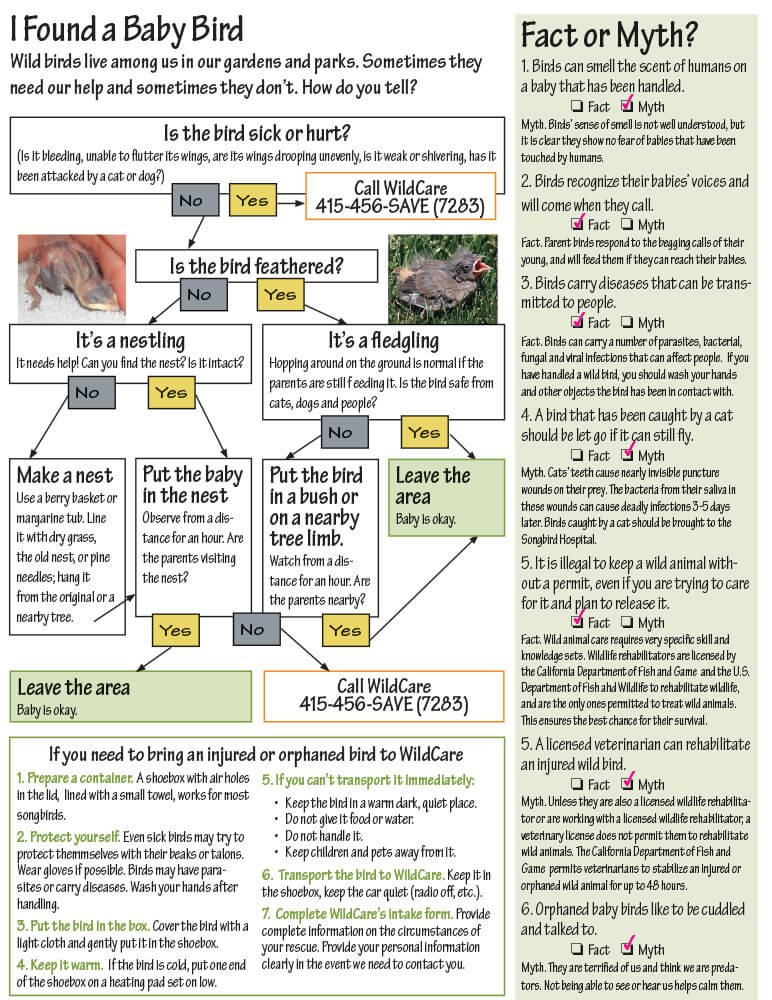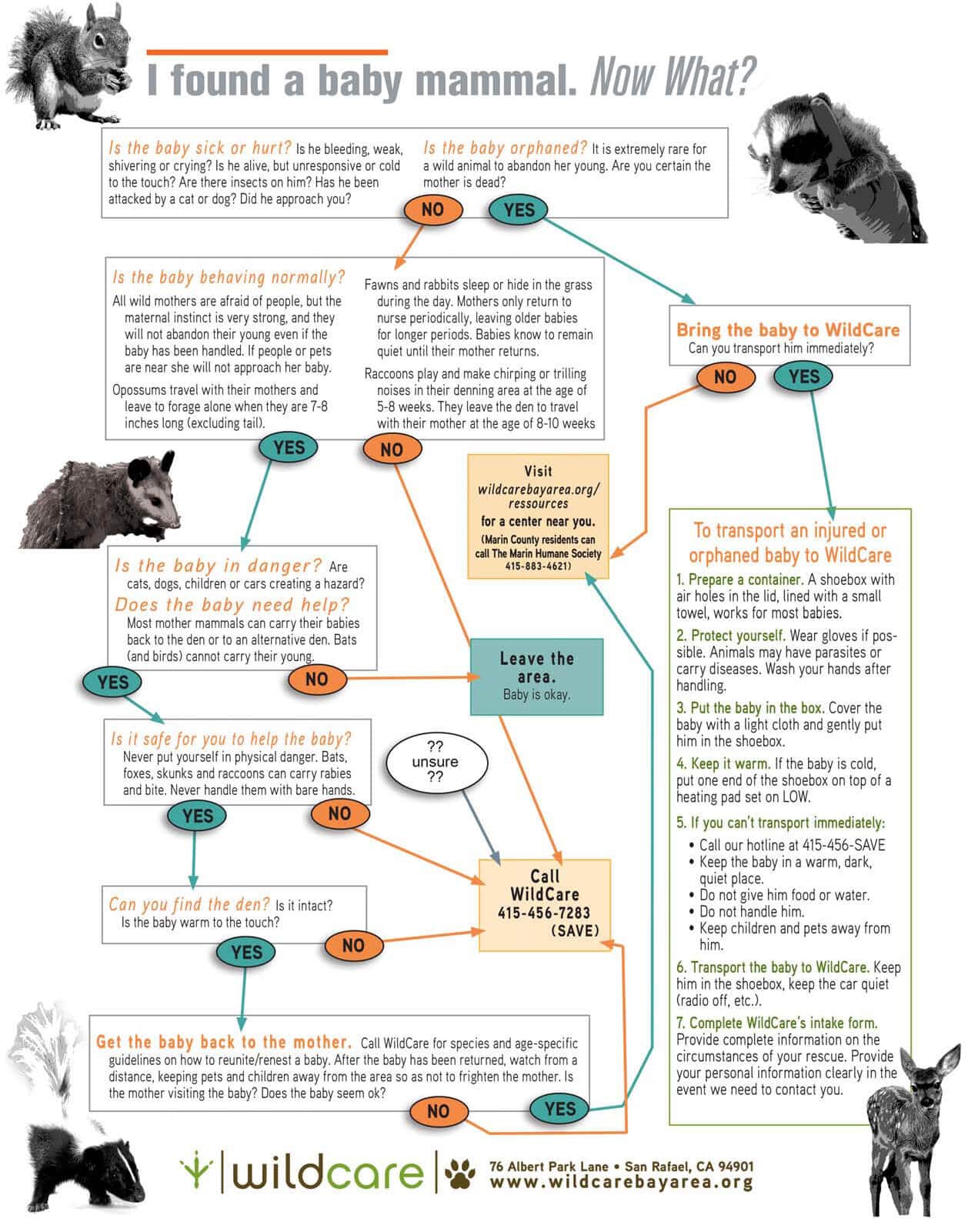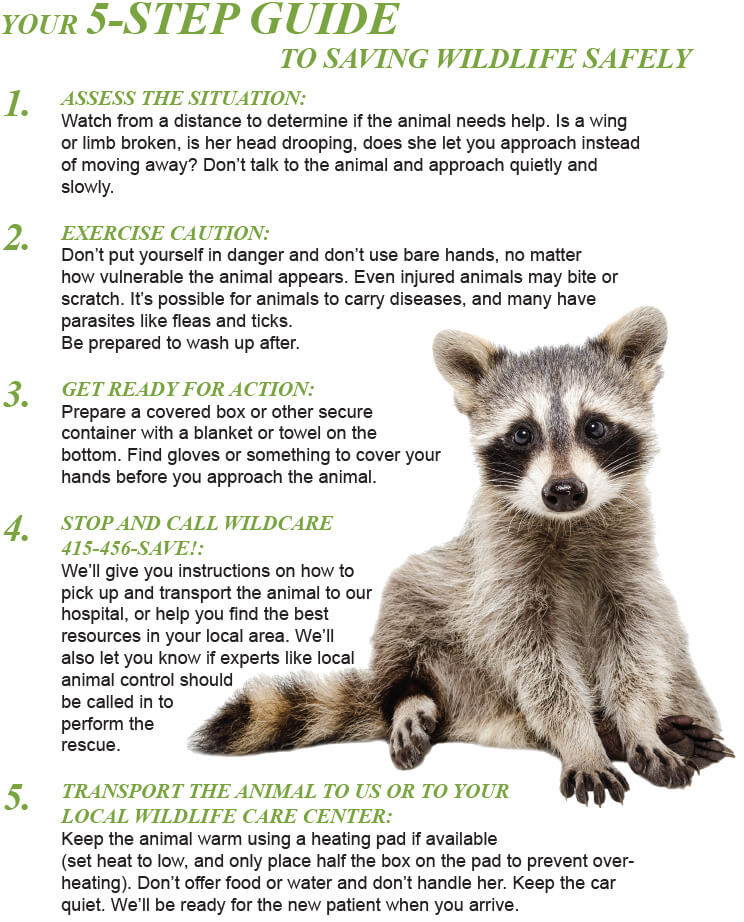Found an Animal FAQ
What do I do if I find an ill, injured or orphaned animal?
Safety first - even baby animals can scratch or bite. If you handle a wild animal, always wear gloves (or other hand covering) and eye protection! Never approach or attempt to handle a wild animal unless you are certain you can do so without harm to yourself or the animal! Unless the animal is obviously injured and in distress, do not approach it unless directed to do so. Don't become a kidnapper!
How to Get Help:
- For assistance with wildlife: call WildCare at 415-456-7283. Operators are available from 9am to 5pm, 365 days a year
- After 5pm PST: for wildlife emergencies only, call our Wildlife Emergency Nightline, staffed by trained volunteers, also at 415-456-7283.
- WildCare's Wildlife Hospital is open to admit animal patients from 9am - 5pm, seven days a week.
Some wildlife may look orphaned or abandoned, but may not actually need your help.
Don't "kidnap" a wild animal! The first things to look for if you think a wild animal of any age needs rescue are the Five Cs. If an animal demonstrates any of these five symptoms, it is an emergency and he needs immediate help:
- Is he Crying?
- Is he Coming toward you (approaching people)?
- Is he Covered with blood or insects?
- Has he been Caught by a cat or a dog?
- Is he Cold?
If the answer to any of these questions is yes, immediately call WildCare's Hotline at 415-456-7283 for assistance and advice.
Scenarios
The Five Cs are very obvious symptoms that indicate an animal needs help. But sometimes it's not as clear whether your intervention would be in the animal's best interest.
Take a look at some actual scenarios from WildCare's records and see how you would respond:
Scenario 1: A tiny fawn appears one morning under the bushes next to your front porch. She's sitting completely still and isn't making a sound. The baby isn't very well hidden, and there's no sign of the mother deer. Does she need help?
- Answer: No! That baby is fine and does not need rescue. Deer, like Jackrabbits, will leave their young alone for up to twelve hours at a time while they forage. The babies know to stay still and quiet, tucked into the grass where their mother left them. Sometimes the mother deer makes a poor choice as to where her baby should spend the daylight hours, but she is probably nearby, and worried that a predator (you!) has discovered her fawn. Leave the fawn alone by removing yourself completely from the scene and eventually Mom will come back to retrieve her baby.
Scenario 2: Last night's wind left a lot of debris in the park where you walk your dog. Your foot dislodges a leaf and underneath you find a small fluff-covered bird. He's alive, but his little belly is cool to the touch. Does he need help?
- Answer: Yes! That baby definitely needs to come to WildCare. If a baby is cool or cold, he's in trouble and needs help immediately.
Scenario 3: The mockingbird hops around the yard with little trouble, but no matter how long you watch him, he doesn't attempt to fly. There are other birds around, but you're worried about neighborhood cats. Does he need help?
- Answer: No! That baby is a fledgling, and hopping around without flying is an important part of his maturation process. A fledgling songbird will look like an adult bird, except his tail feathers will be shorter (stubby-looking) and he may have a little baby fluff still on his head. While neighborhood cats are a real hazard to birds of all ages (WildCare encourages cat owners to keep their pets indoors, especially during wildlife baby season), a fledgling bird's parents are on the alert for dangers, and they are actively directing their young one to safety. They will also continue to feed him. Give fledglings their best chance at success by keeping people and pets away from them during this important part of their development.
Always call WildCare's Living with Wildlife Hotline at 415-456-SAVE (7283) if you have questions or concerns about a potential rescue.
- Never touch a mammal with bare hands.
- Always wear eye protection and protect your hands and arms (wear gloves if available) when attempting to capture a wild animal.
- Carefully and thoroughly assess the situation to determine if capture is safe for you, and for the animal, before attempting a capture.
- Once you are certain an animal needs help, find a secure container with pre-punched air holes (for example, a shoebox, paper bag or pet carrier), ideally with a towel or other cloth on the bottom to prevent the animal from sliding. Make sure the container has a lid that won't open, as you do not want the animal to escape.
- Approach the animal slowly, without speaking to him or making unnecessary noise. Throwing a towel over him may be an option.
- Once you have the animal contained, remember that it is easy for animals to overheat, so do NOT tightly wrap the animal or bury him in blankets or towels. Making sure a wild animal's eyes are covered is important to reduce stress, but covering him tightly so he can't breathe or gets too hot is very dangerous. If you're using a heating pad, be sure to only put HALF of the container on the pad, to give the animal the option to move off the heat if he gets too hot. Too much heat can kill as easily as too much cold!
- Never give an animal any food, fluids or medications, as these will usually end up on the animal's fur or feathers during transport. Resist the urge to peer in at the animal or speak to him. Wild animals can die from stress alone, and they see humans as predators. Bring the animal to WildCare or your local wildlife hospital immediately.
- Call WildCare at 415-456-SAVE (7283) before approaching any animal.
- Do not give the animal any food or water. Feeding an animal an incorrect diet can result in injury or death. Also, a captured animal will get food and water stuck in her fur/feathers potentially leading to discomfort and hypothermia.
- Place the animal in an appropriately-sized, secure box with a towel or paper towel on the bottom. Make sure the box has holes in the lid.
- Keep the animal in a warm, dark, quiet place. If you want to use a heating pad or other heat source, be sure to only place HALF of the box/container on the heat source. Overheating is a big risk for rescued animals, so you must make sure that the animal can move off the heat if he gets too hot.
- Leave the animal alone. Remember human noise, touch and eye contact are very stressful to wild animals.
- Keep children and pets away.
- Follow the instructions given to you by the WildCare Hotline Operator.
The following animals are rabies-vector species and MUST NOT be handled with bare hands.
Please call for assistance before attempting to rescue one of these species 415-456-7283:
- bats
- raccoons
- skunks
- foxes
- coyotes
Types of Animals
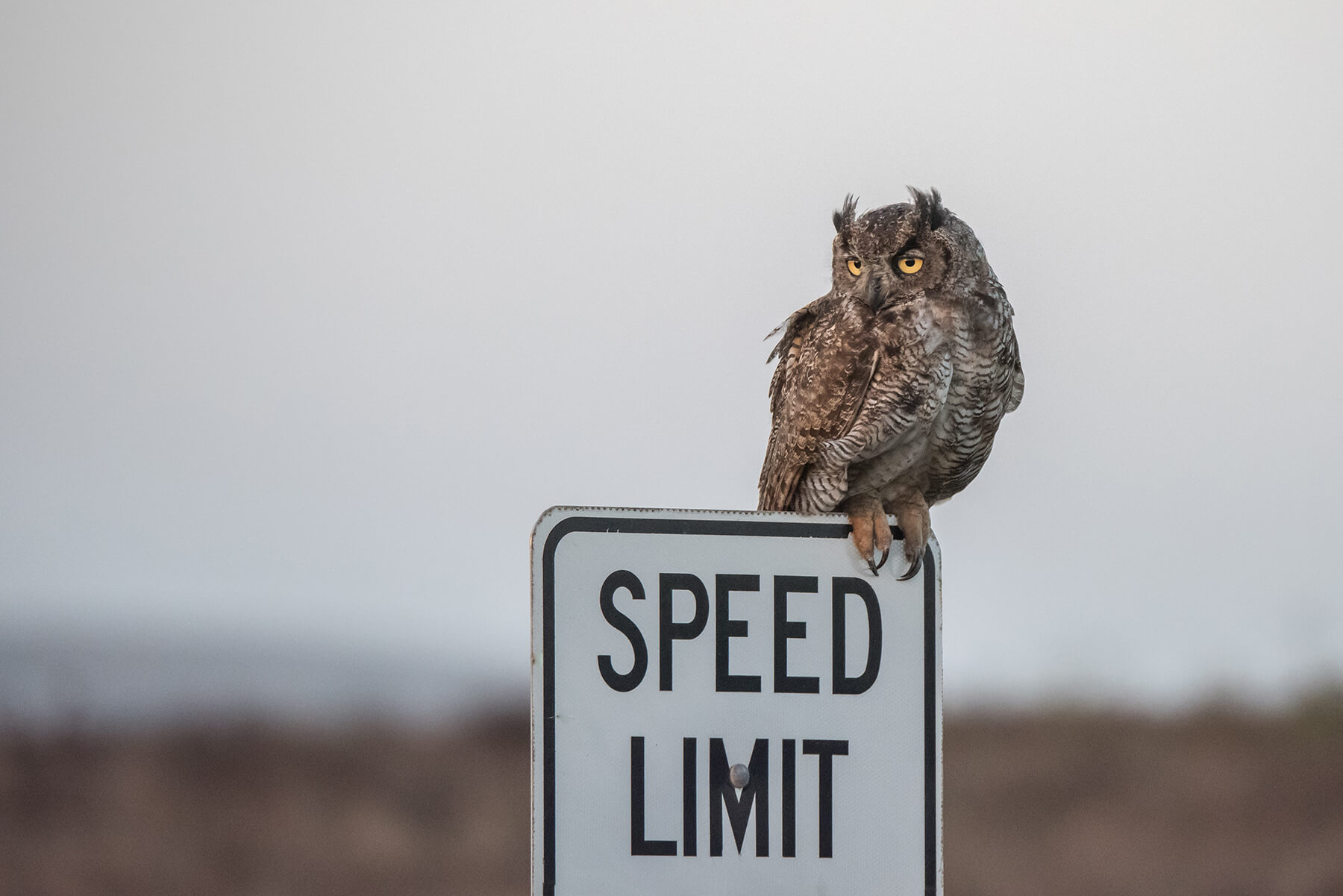 If an adult wild animal lets you get close to him, something is wrong.
If an adult wild animal lets you get close to him, something is wrong.
Even a seemingly calm adult animal is actually frightened and stressed and can be extremely dangerous if cornered. If you are certain it is safe for you to do so, and you are able to capture the injured animal, you should bring him to WildCare. Be sure to always protect yourself with gloves and safety glasses when attempting a capture. Having a towel and a secure, ventilated carrying box will be useful, too.
The injured adult wildlife that may be exceptions are birds that have flown into windows and are momentarily stunned. If this happens and you see no injuries, place the bird in a ventilated cardboard box that is "just the right size" and close it. Put the box somewhere safe and quiet outside, then check on the bird in 30 to 60 minutes. If he still cannot fly away, then he needs to come to WildCare. If he takes off on his own once you open the box, congratulations on your first rescue!
If you live in Marin County, California and know an animal needs help, but you are uncomfortable handling him, call the Marin Humane Society at 415-883-4621. Their officers have special training and equipment to handle wildlife, and they will transport the animal to WildCare.
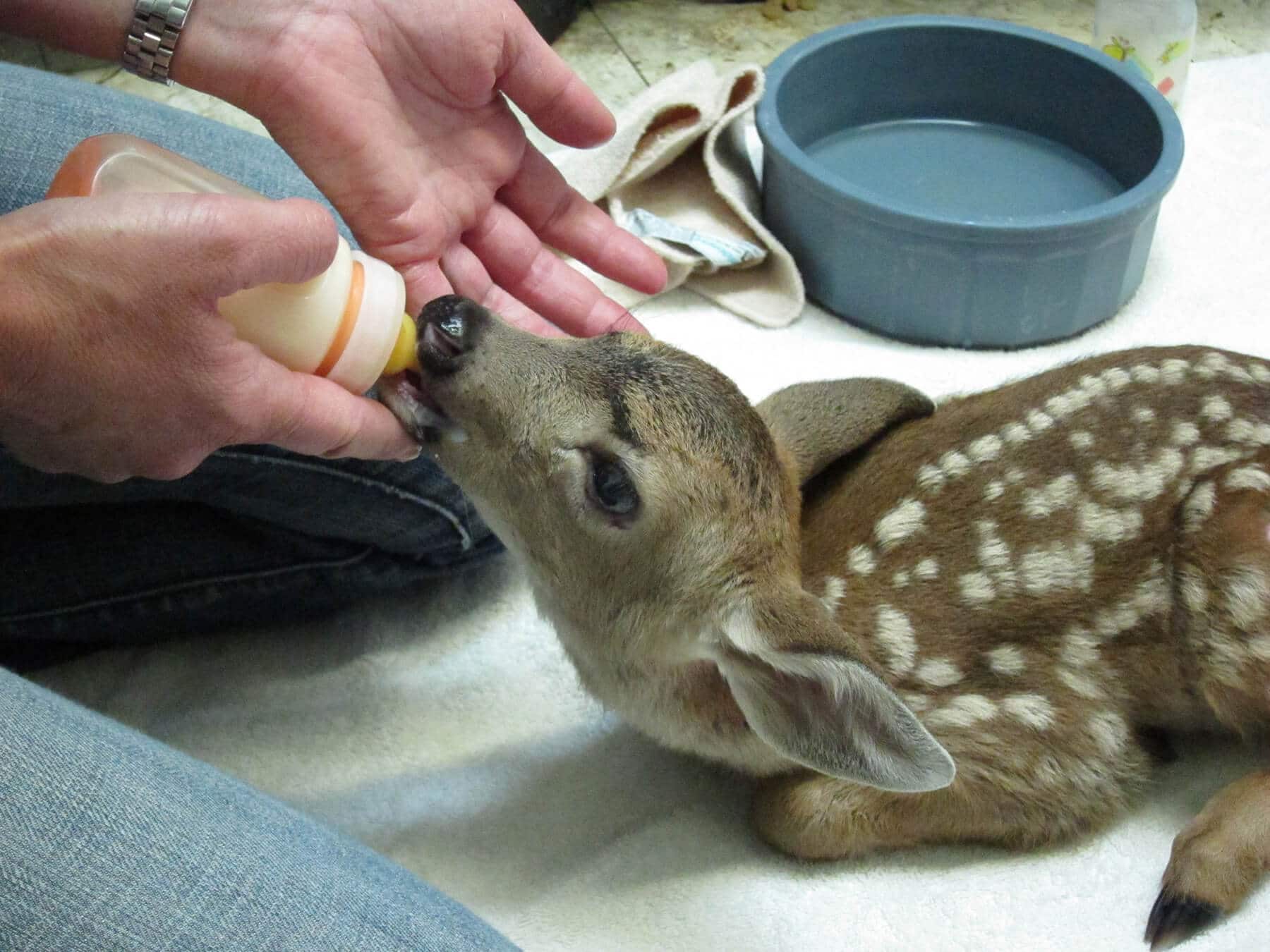 Is the baby warm and healthy? He may not be truly orphaned. Wildlife parents may leave their young for long periods of time while they forage for food, but they are probably watching you from afar.
Is the baby warm and healthy? He may not be truly orphaned. Wildlife parents may leave their young for long periods of time while they forage for food, but they are probably watching you from afar.
Do not assume a young animal you find has been abandoned. Many animals leave their young for long periods of time while they forage.
****However, any baby bird on the ground that does not yet have feathers (is fluff-covered or naked) needs immediate warmth and care. Always rescue a nestling baby bird, or a naked or eyes-closed baby mammal of any species.****
If the baby is not a nestling or an eyes-closed mammal and is not exhibiting any of the Five Cs, step away and observe from a distance, or leave and return later; the parents will not come to their baby if predators (YOU!) are near. Keep all pets and humans away! It is crucial that the returning parent is not threatened by your good intentions into abandoning her young.
If you do pick up the animal and the baby is warm and healthy, you may be able to return him to his nest or leave him hidden where you found him. Remember it is a MYTH that wild animals will reject their young if humans touch them!
Spring, summer and even early fall are baby season for wild things. These are also the times of year when people are outdoors enjoying the lovely weather. Whether on a trail, in the garden or under your deck, it's inevitable that people and wildlife are going to meet during the warmer months of the year.
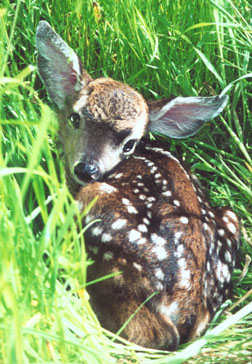
Jackrabbits and deer will leave their babies for up to 12 hours. A fawn or leveret (baby hare) is likely not orphaned if found still and quiet in the grass. Photo by Susan Sasso
Deer and hares (Jackrabbits) have one or two young and hide twins in separate locations for up to twelve hours at a time, returning to nurse in the early morning and early evening.
Brush Rabbits have larger litters in a single nest, but those babies, too, will be left alone for long periods of time. If you are uncertain whether the mother Brush Rabbit is around, you can lay small twigs in a pattern across the entrance to the rabbit's nest, and check the next day to see if they have been disturbed.
A warm quiet baby found in the grass with no obvious injuries is probably not abandoned. Fawns and young rabbits remain quiet and still so that predators will not find them. If all is well, the mother will likely move her baby after the next feeding, which may not be for several hours.
Call WildCare 415-456-7283 or your local rehabilitation hospital if the baby you saw is still there after 24 hours, if a fawn is bleating (crying) and walking around in the open, or you are certain the mother has been killed.

Young Virginia Opossums explore their mother's pouch. These babies are almost weaned. Photo by Alison Hermance
Neonate (newborn) opossums are sometimes found alive inside the pouch of a dead mother. If you see a dead mother opossum and it is safe to do so, always check the pouch and surrounding grass for straggling babies. If you find live babies in the pouch, you can bring the mother's body to WildCare or your local wildlife center immediately. Don't attempt to detach live babies from a dead mother, as the babies' mouths are closed around the nipple and removal must be done very carefully.
Opossums cannot be reunited with their mothers, and an opossum shorter than ten inches (including tail), will need warmth and care.
Juvenile opossums are fully furred and have outgrown their mother's pouch. By instinct, they cling to her as she forages, and eventually fall off. If unable to get back to her, a baby is then on his own, a natural dispersal strategy. If healthy and ten inches or longer he is old enough to take care of himself and doesn't need rescue.

Raccoons are great mothers. Photo from WildCare archives
Neonate raccoons are helpless for about six weeks, and their mother usually keeps them well hidden. You are unlikely to encounter baby raccoons unless their nest is disturbed or their mother is interrupted while moving them. Raccoons are very attached to their young. If a mother is alive and she has been separated from all her young, she will try aggressively to retrieve them for several nights. If allowed to reach them, she will move them to an alternate nest. Call WildCare for assistance with reuniting a family or if you have found a single neonate (newborn) raccoon. Never handle a raccoon OF ANY AGE with your bare hands.
Juvenile raccoons leave the nest at about eight to ten weeks of age and begin to travel with their mother. From then on they have no permanent den site. If excluding raccoons from your walls, attics or crawlspaces is a goal, this is when it is safe to do so.
If you need help excluding wildlife from your property, call WildCare Solutions at 415-453-1000 x23! We offer effective, humane, non-lethal help to resolve wildlife conflicts.
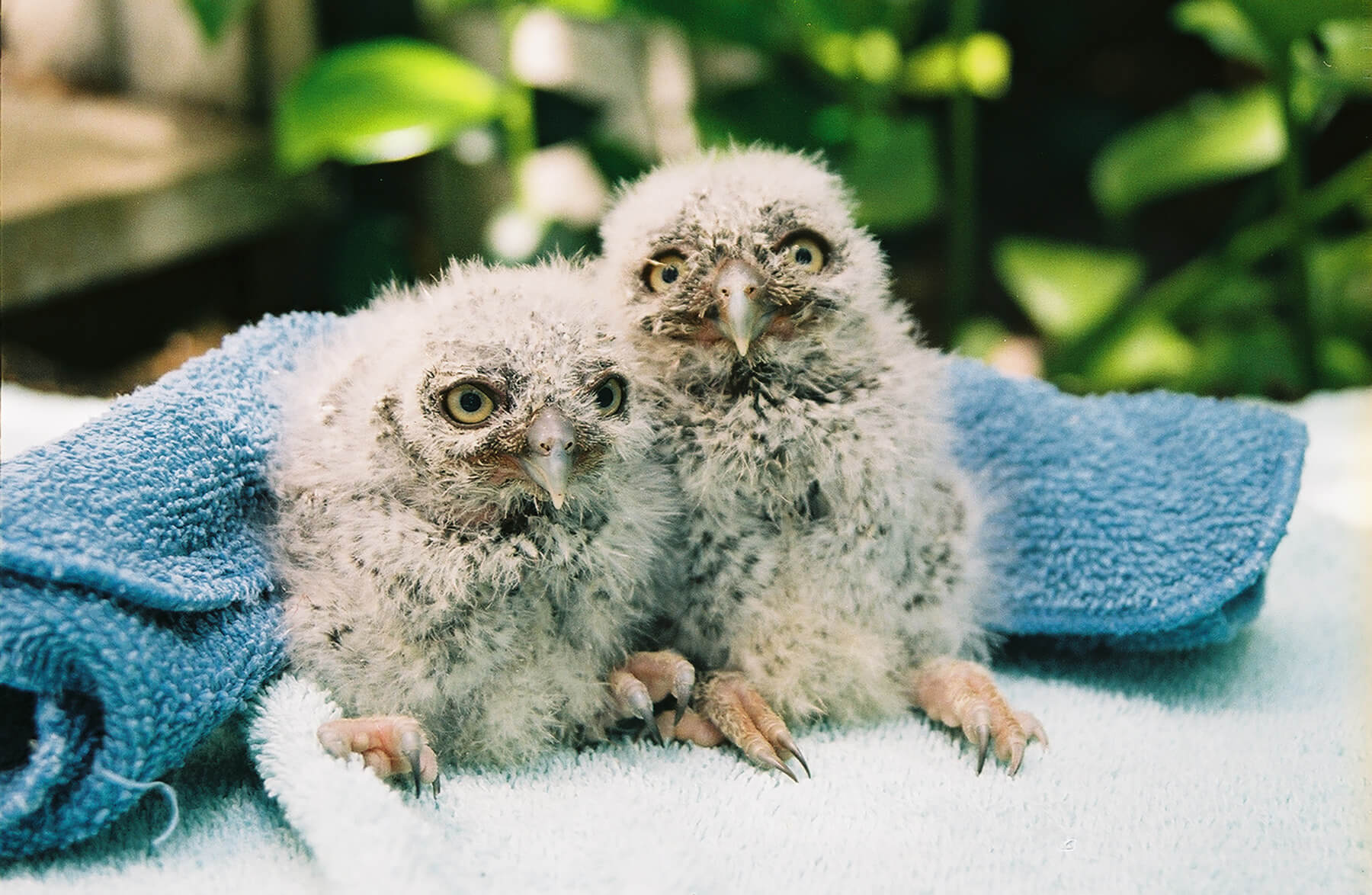
Downy baby raptors found on the ground should come to WildCare, but watch out for sharp beaks and talons! Photo by Melanie Piazza
Hawks, owls raptors and vultures of all ages have sharp talons and beaks.
Adult raptors and vultures can be very aggressive when protecting their young. Nestlings with downy fluff on their bodies found on the ground should be brought to a wildlife hospital immediately. Babies at this age are not able to thermoregulate (control their body temperature) on their own, so they need immediate warmth.
"Branchers" are fledgling raptors. If the bird is old enough to have feathers and very little downy fluff, and he's healthy and on the ground, chances are he is just learning to fly and should be left alone. Call WildCare if the bird appears injured, or you are uncertain. WildCare's Hungry Owl Project has experienced tree climbers who are able to put young raptors of all ages back into their nests. Many local wildlife centers will have similar programs.
Every year hundreds of baby birds fall or are blown from their nests, or are found following an ill-timed tree trimming. A pink, featherless nestling definitely needs to be rescued, as does any baby that is injured or ill. But a feathered fledgling on the ground who appears bright-eyed, hopping, and healthy may actually not be in trouble. WildCare's Hotline team works hard to prevent "over-rescue" (inadvertent "kidnapping") of young birds at this time of year.
For many bird species, leaving the nest before being flighted is a natural part of adolescence.
Young birds with developing feathers frequently take up residence on the ground in the grass or bushes near their old nest where they continue to be fed and taught by their parents. Some things to keep in mind about birds:
- Parent birds will continue to feed their babies after you have touched them. Most birds have a poor sense of smell and parent birds won't know (or care!) that you have touched their baby. Baby birds can be returned to the nest! Parent birds will even be foster parents for an abandoned baby of the same species and age of their own young.
- Parent birds will search for their babies even after 24 to 48 hours of absence. Most birds have their own territories. Even if the nest and babies are gone, the parents remain in their home territory, waiting to welcome their babies home.
- Birds only need to be rescued if they are:
- naked (no feathers) or downy (fluffy white feathers)
- injured
- caught by a cat or dog
- icy cold
- orphaned
- Symptoms of an Injury or Illness:
- Falling over on one side
- Unable to flutter wings
- Weak or shivering
- Attacked by cat or dog
- Wing tweaked upward
- Wing drooping
- Feathers fluffed
- Bleeding
Has the Bird Been Abandoned?
Watch for the parent! Observe the baby bird continuously for 60 to 90 minutes from a distance of 50 feet. Watch carefully; the parents will fly in and out quickly.
If you have the bird in a box, check the feces…
- Clear with white poop (or green bile) indicates a baby bird is not being fed, and is likely abandoned.
- Color in the poop indicates that the parents are feeding the baby, and the bird should be put back where it was found.
Nestlings:

Songbirds may be returned to the nest if found on the ground, unless they're cold or injured. Photo by Alison Hermance
Nestlings are pink, helpless, featherless or pin-feathered birds that cannot keep themselves warm. Any nestling bird found on the ground is at great risk of hypothermia. Always pick up a nestling and keep him warm, while calling WildCare at 415-456-7283. Despite what we may have learned as children, parent birds will NOT reject their babies just because they have been handled by humans. WildCare reunites dozens of baby birds with their parents every year. As long as the baby birds are warm and healthy, the parents will accept them back into the nest. In fact, they will even accept and care for orphaned baby birds of the same age and species as their own nestlings. However, because nestlings cannot yet regulate their body temperature, they are extremely prone to hypothermia. Just assume that a nestling baby bird on the ground needs immediate help and warmth.
An entire nest of birds that falls down can sometimes be renested. Call WildCare's Hotline at 415-456-7283 for advice before attempting to renest. You may be instructed to place the baby birds and what remains of the nest in a strawberry basket or tub with drainage holes punched in the bottom, and hang the basket or tub to a tree in the exact location of the original nest site. Be sure that a branch shields the nestlings from sunburn and the eyes of predators like crows. Many situations are not appropriate for renesting, however, and if the babies were injured in their fall they will need care. Always call WildCare first 415-456-7283.
Never attempt to renest a single baby bird in a separate nest. Parent birds will only sit on and feed the babies in one nest. Generally nestlings should come to WildCare for care. Call us at 415-456-7283.
Fledglings:
These birds have feathers and short tails and can perch, hop or walk. They are learning to fly, a process that may take two weeks. Fledglings should be left alone to practice hopping and fluttering from low shrub branches to the ground. The parents are close by, and continue to feed the babies until they learn to fly and eat on their own. Parents will guide the fledglings into the bushes at night to hide from predators.
To return a fledgling to its territory after it has been brought indoors:
- Keep pets and children indoors so the parents will return to their baby.
- If a bird can perch on your finger, place it in a bush near the area you found it.
- If you found the bird in a high-traffic area, move it to a safe area under the cover of bushes.
- Parents communicate with their young by a series of voice calls. As long as a fledgling is placed in its home territory, the parents will be able to locate it and move it to a safe location.
- At a distance, (indoors is best) watch continuously for one hour for the parents to return. If the parents don't return, call WildCare immediately.
Always call WildCare 415-456-SAVE (7283) before handling a baby bird!
While parent birds will accept a baby back if it has been touched by humans, the stress on the bird can be detrimental. If a baby is naked (without feathers or with few feathers) the requirement for immediate action is much higher.

Squirrels are good moms too, and will often recover their babies and carry them to a new nest if given the opportunity. Photo by Alison Hermance
Neonate (newborn) squirrels are usually found when a nest (called a "drey") has been destroyed. Squirrels are excellent parents, but they are casual nest-builders, so they often have more than one drey. If one or more baby squirrels fall to the ground, their mother will often retrieve them.
If you find uninjured babies and think the mother is still in the vicinity, nestle them in a warm, shallow box at the base of the tree they fell from, or in a basket suspended so it rests against the trunk, and leave the area. Call WildCare 415-456-7283 if the mother has not returned within two or three hours.
Juvenile squirrels are still dependent on their mother. Call WildCare for advice if a juvenile squirrel approaches you, as it may be a sign that he needs medical care. Squirrels have very sharp teeth and strong jaws- never handle a squirrel without gloves.
Any fluffy duckling or gosling on his own needs to be rescued.
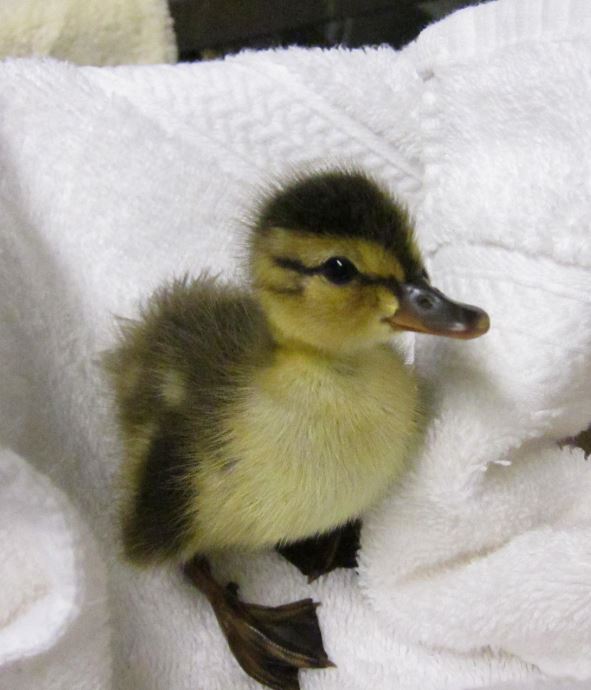
WildCare's first duckling of 2016 got separated from his family as they trekked toward water. Photo by Alison Hermance
Mallards and other duck and goose species have large broods of young, and the babies come out of the egg precocial, meaning they can walk, swim and eat adult food almost immediately. As soon as her clutch has fully hatched, a mother duck or goose will escort her young to a water source. If the lake, pond or stream is a distance away, or especially if it is across a busy road, it is easy for mother and babies to become separated.
Many of the orphaned ducklings and goslings admitted to WildCare lose their families in this manner. Babies also get separated when they are washed away in gutters during rain storms, or when they get trapped in storm drains.
If you see a duckling alone, look for mom. She may be just around the bend, waiting for her little ones to catch up. If mom isn't obviously nearby and you're able to capture the duckling and transport him close to a mother with young, he'll easily return to the bosom of the family… even if it isn't his original family! If no mother duck is within sight, bring the baby to your closest wildlife rescue center. WildCare admits over 200 Mallard Ducklings every year to our Wildlife Hospital.
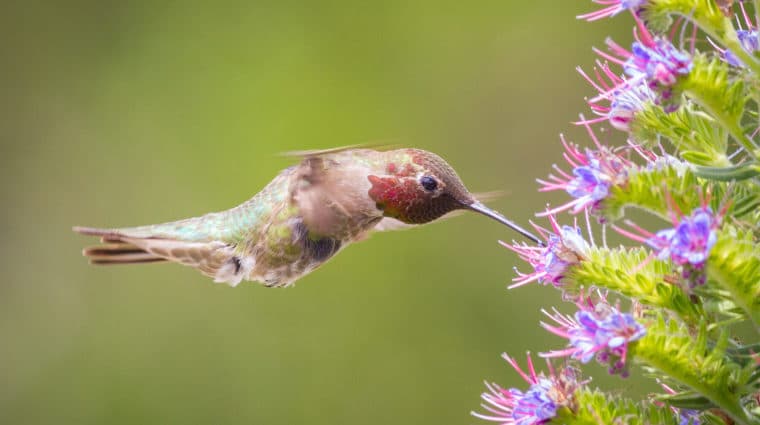 If you find an injured or orphaned hummingbird on the ground, lift it along with the material it is sitting on, and place it on crumpled tissue in a shoebox with holes in the lid. Always use tissue or paper towels, NOT cloth-the bird's feet may become entangled in the cloth.
If you find an injured or orphaned hummingbird on the ground, lift it along with the material it is sitting on, and place it on crumpled tissue in a shoebox with holes in the lid. Always use tissue or paper towels, NOT cloth-the bird's feet may become entangled in the cloth.
Call WildCare immediately (415-456-SAVE (7283). Hummingbirds will die within four hours if not fed. Hummingbird babies that are fed sugarwater or commercial hummingbird nectar for more than 24 hours may develop crippling deformities.
Never attempt to remove baby hummingbirds from their nest. Young hummingbirds secure themselves to the nest by weaving their tiny toes around the nest fabric. So firm is their hold, that if lifted from the nest, most often the legs are left behind.
It can be very difficult to tell if a baby jackrabbit is orphaned.
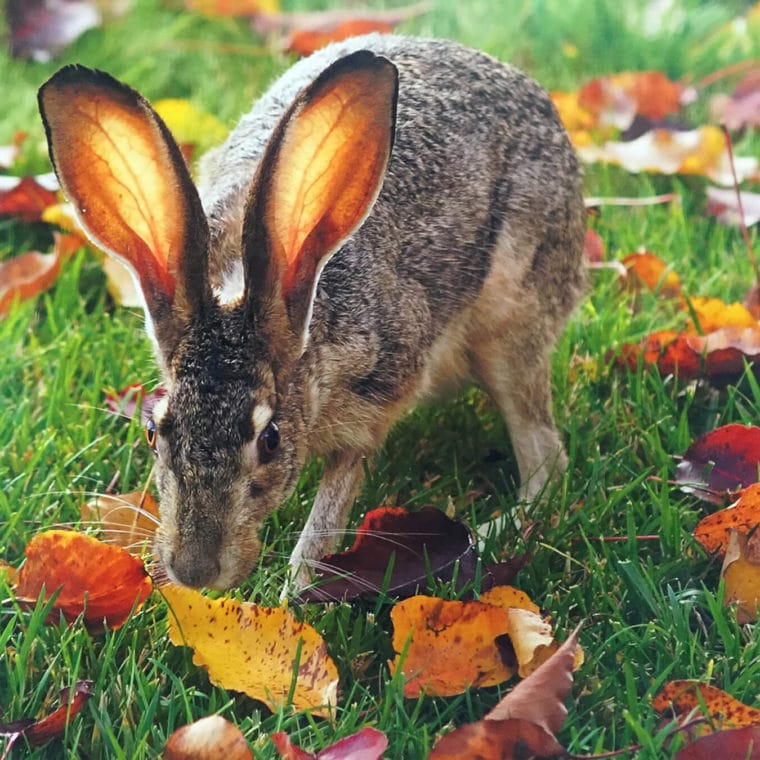 Always call WildCare 415-456-SAVE (7283) before approaching a jackrabbit to determine if it needs rescuing! Some facts to keep in mind about jackrabbit behavior:
Always call WildCare 415-456-SAVE (7283) before approaching a jackrabbit to determine if it needs rescuing! Some facts to keep in mind about jackrabbit behavior:
- Jackrabbits are "precocial," meaning they are born fully furred with their eyes open, and will start nibbling greens within a week.
- A baby jackrabbit is called a leveret. A leveret's main defense when threatened is to freeze, which is often mistaken by people as being calm. The animal is not calm, it is terrified.
- The mother jackrabbit separates her litter for a better chance of some babies surviving.
- There is no nest! Jackrabbit young will stay hidden in the grass, shrubs, or other ground-level growth where the mother leaves them.
- The mother only comes to feed the young two or three times a day. Otherwise, the young jackrabbits are left alone. Even if you are watching carefully, you may not see the mother jackrabbit return to her young. Do not assume the babies are orphaned simply because you do not see the mother!
- Leverets will wander a bit. When the mother returns to the area, she calls to her young and they come to nurse.
- Never try to feed a leveret, they have very delicate digestive systems.
- Jackrabbits are extremely high-stress animals; they can die from fear.
- Jackrabbits have very strong hind limbs and if restrained may kick out hard enough to break their own backs.
General FAQs
Call WildCare's Living with Wildlife Hotline (415-456-SAVE (7283)) immediately and see above for important information on what to do with an injured animal.
An adult animal that lets you approach him is in distress and needs rescue.
A baby animal on the ground alone needs rescue, unless the baby is a fawn (baby deer) or a baby Jackrabbit. Any baby with downy fluff (birds) or a baby with his eyes still sealed shut (mammals) needs IMMEDIATE care.
Please see above for species-specific rescue information.
Most wildlife care centers couldn't exist without animal care volunteers, and WildCare is no exception! WildCare has several volunteer opportunities available. Learn more here! Potential Wildlife Hospital Volunteers must complete an application, attend a New Volunteer Orientation, complete our series of New Volunteer Training Classes, and then commit to one 4-hour shift per week in the Wildlife Hospital. See dates for upcoming orientation and and learn more about volunteering in the Wildlife Hospital
You can learn more about the specifics in our volunteer section. We are always seeking interested people. If you do not live in the Bay Area, you can use the Animal Help Now site to find wildlife rehabilitation centers in your area.
Yes, we are open 365 days a year. Hours may be abbreviated on Thanksgiving, Christmas Eve and Day and New Year's Day. Please call 415-456-7283 to confirm courtyard hours on those days. Click here for WildCare's address and driving directions to our location.
WildCare is a 501(c)3 non-profit organization. Our EIN is 51-0172331.
Yes. Please click for a PDF of WildCare's commitment to maintaining the privacy and security of our constituents.
Keeping a native wild animal in the State of California is against the law if you do not have the proper permits and licenses, even if you plan to release the animal.
Raising a wild animal from babyhood is a tremendously challenging process.
For instance, raising a wild bird properly takes 2 to 4 months of intensive care. During this time, naked and pre-feathered nestlings must be fed every 20 to 30 minutes from dawn to dusk (roughly 14 hours) every day. Skipping any feedings or feeding the wrong diet during this critical period can result in irreversible deformities that may not be seen until the bird is a juvenile.
Each animal species has specific caloric and natural diet needs and babies need to be taught how to recognize, find and eat these foods in order to survive in the wild. Once self-feeding, they also need weeks in a large, protected outdoor flight aviary or cage to build up muscles and skills that will allow them to compete in their natural environment.
Wildlife rehabilitators are equipped with the proper licensing, have extensive knowledge of nutritional and dietary requirements, and have the facilities to properly raise wild patients. All ill, injured or orphaned wild animals must be brought to a licensed wildlife care center like WildCare.
Not in the Bay Area? Use the Animal Help Now app to find local wildlife care centers in your area.
When you bring us an animal you will be given a patient record number. You may call us and use this number (or the name of the rescuer) to follow the progress of the animal's treatment by calling WildCare's Hotline at 415-456-7283.
We encourage our rescuers to assist in the release of animals they have brought to our facility, and we always try to accommodate requests to release. However, since the animal's needs must be our top priority, it is not always possible to accommodate rescuers' requests and schedules.
Please let our team know you would like to be part of the release and we will do our best to accommodate.
No. Owls are wild animals and wild animals do not make good pets.
Not only is it against the law to keep a native or migratory wild animal in your possession, it is also extremely difficult to give a wild creature the freedom, space and proper nutrition necessary for its survival.
For their sake, and yours, wild animals should always live in the wild.
WildCare does often need donations of towels, sheets, blankets and other supplies, but due to our lack of storage space, the need for those supplies fluctuates. Please call our front desk at 415-456-7283 if you have items to donate and we will let you know if we can use them.
Yes! WildCare currently has more than enough knitted nests for this year's Baby Season (please don't knit more for us!) Thank you to everyone who knitted nests for our baby birds!
For answers to your questions, please refer to the Avian Influenza page on the Centers for Disease Control and Prevention (CDC) website
Resources
Additional resources may be found at the following sites, but please note that these are not WildCare websites:
- National Wildlife Rehabilitators Association (NWRA)
- International Wildlife Rehabilitation Council (IWRC)
- wildliferehabinfo.org
- wildliferehabber.com
These are downloadable apps for your smartphone that can often provide timely assistance:
- Animal Help Now, a website and downloadable app that "leverages digital technologies to immediately connect people involved with animal emergencies with the most appropriate time- and location-specific resources and services."
- Wild Help "a free mobile app to find help for a wild animal, fast"
Listings by state:
Alabama
Alaska
- No online listing of rehabilitators. Contact the Alaska Dept. of Fish and Game for assistance.
Arizona
Arkansas
- For migratory birds: Arkansas Game and Fish Commission List of Bird Rehabilitators
- Animals other than birds: Arkansas Game and Fish Commission List of Wildlife Rehabilitators
California
- If you are in the San Francisco Bay Area, call WildCare at 415-456-7283. We are located in Marin County and serve the greater Bay Area. Visit the California Council for Wildlife Rehabilitators (CCWR) website for a list of rehabilitators state-wide.
Colorado
Connecticut
Delaware
District of Columbia
Florida
- Click to the Florida Fish and Wildlife Conservation Commission website for information on various species or click for a PDF list of licensed rehabilitators in Florida.
Georgia
Hawaii
- No online listing of rehabilitators. Call your local Division of Forestry and Wildlife office for assistance.
Idaho
- No online listing of rehabilitators. Contact your Idaho Fish and Game Regional Office.
Illinois
Indiana
- Indiana Dept. of Natural Resources Licensed Wildlife Rehabilitators. If you are unable to locate a rehabilitator, call your DNR law enforcement district or regional headquarters.
Iowa
Kansas
Kentucky
Louisiana
Maine
Massachusetts
- Massachusetts Division of Fisheries and Wildlife Rehabilitators List (Click your district on the right side of the page.)
Maryland
Michigan
Minnesota
Mississippi
Missouri
- No online listing of rehabilitators. Call your Missouri Department of Conservation Regional Office to locate a licensed rehabilitator or try this website.
Montana
Nebraska
- No online listing of wildlife rehabilitators. Call your local Game and Parks Commission Conservation Officer to locate a licensed wildlife rehabilitator. You can also try contacting Nebraska Wildlife Rehab, Raptor Woodland Refuge, Fontanelle Forest Nature Center (or call their Raptor recovery Rescue Hotline 1-866-888-7261), or Wildlife Rescue Team.
Nevada
New Hampshire
New Jersey
New Mexico
- Call your local Game and Fish office to locate a licensed rehabilitator. You can also consult Animal Protection of New Mexico's list of wildlife rehabilitators.
New York
North Carolina
North Dakota
- No online listing of wildlife rehabilitators. Call your local Game and Fish District Office or a veterinarian for assistance.
Ohio
Oklahoma
Oregon
Pennsylvania
- Pennsylvania Association of Wildlife Rehabilitators Listing by County. If you are unable to find a wildlife rehabilitator, call your local Pennsylvania Game Commission Regional Office.
Rhode Island
- Wildlife Rehabilitators Association of Rhode Island.
If you are unable to find a wildlife rehabilitator, call the Rhode Island Dept. of Environmental Management at 401-789-3094 or 401-789-0281.
South Carolina
South Dakota
- No online listing of wildlife rehabilitators. Call your Game, Fish & Parks Wildlife Division office to locate a licensed rehabilitator.
Tennessee
Texas
Utah
Vermont
Virginia
Washington
West Virginia
- Does not permit rehabilitation of state wildlife. Call your local Dept. of Natural Resources District Office for assistance. For raptors, you can also try contacting West Virginia Raptor Rehabilitation Center.
Wisconsin
- Wisconsin Dept. of Natural Resources Wildlife Rehabilitation Directory. If you are unable to find a wildlife rehabilitator, call the DNR's Wildlife Rehabilitation Liaison at 715-359-5508.
Wyoming
- No online listing of rehabilitators. Call your Game & Fish Dept. Regional Office to locate a licensed rehabilitator or try this listing on the National Wildlife Rehabilitators Association (NWRA) website.

